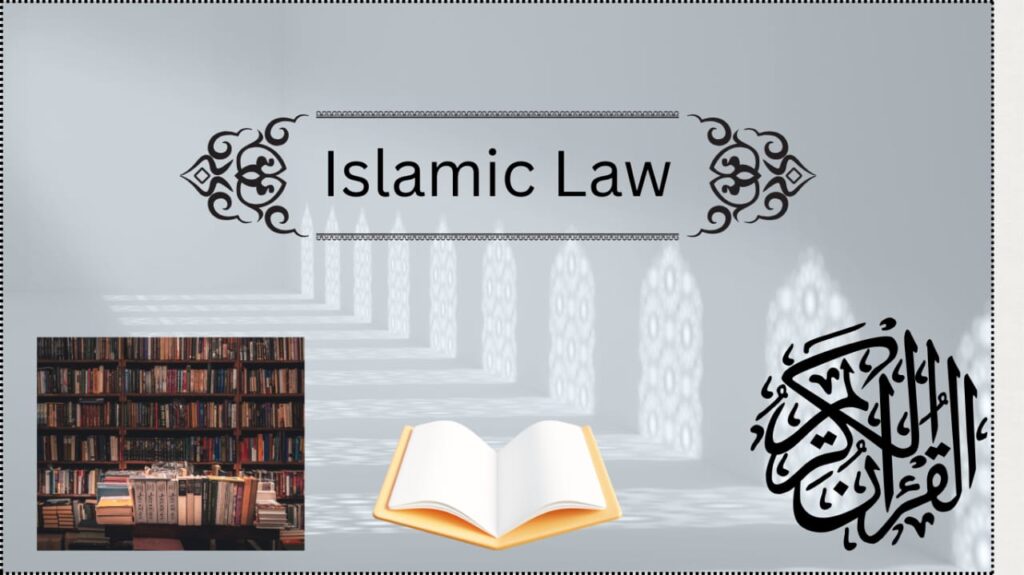- admin
- Comments 0
- 03 Aug 2025
Introduction

Islamic law, or Shariah, is a system of rules and morals for Muslims. It covers every part of life, from worship to daily actions. Fiqh is the human understanding of Shariah. It helps Muslims apply these divine rules to real-life situations. This essay explains the sources of Islamic law, the difference between Shariah and Fiqh, and why they matter to Muslims.Islamic law is a moral and legal system guiding Muslims in daily life. Islamic law shapes worship, family, and justice. People follow Islamic law for fairness and compassion. Islamic law promotes well-being.
Sources of Islamic Law
The Quran
The Quran is the main source of Shariah(Islamic Law). It contains clear commands from Allah. These commands guide Muslims on how to live. The Quran gives rules on worship, family, business, and justice. For example: “Indeed, this Qur’an guides to that which is most suitable and gives good tidings to the believers who do righteous deeds that they will have a great reward.” (Quran 17:9)The Quran tells Muslims how to pray, how to deal with inheritance (Surah An-Nisa, 4:11), marriage (Surah Al-Baqarah, 2:229-232), crime (Surah Al-Ma’idah, 5:38), and trade (Surah Al-Baqarah, 2:275-280).
The Sunnah (Hadith)
The Sunnah is the way Prophet Muhammad (peace be upon him). It includes his words, actions, and approvals. The Hadith is a collection of these teachings. The Sunnah explains the Quran’s guidance in detail. For example, the Quran tells Muslims to pray, but the Sunnah shows how to do it. One famous Hadith says: “The halal (allowed) is clear, and the haram (forbidden) is clear, and between them are doubtful matters that many people do not know about. So, whoever avoids doubtful matters clears himself regarding his religion and honour.” (Sahih Bukhari and Sahih Muslim)This Hadith shows the need to be careful in unclear matters.
- Ijma’ (Consensus) If the Quran and Sunnah do not answer a question, scholars agree on a solution. This agreement is called Ijma’. For example, scholars agreed on how many times Muslims should pray each day. The Quran mentions prayer, but Ijma’ decided on the exact number of daily prayers.
- Qiyas (Reasoning by Analogy) When a new issue arises, scholars use Qiyas. They compare the new issue to something already mentioned in the Quran or Sunnah. For example, alcohol is banned because it intoxicates. Scholars use Qiyas to ban drugs since they have the same effect.
Shariah vs. Fiqh
Shariah and Fiqh are not the same.
- Shariah: These are the divine laws found in the Quran and Sunnah. They are perfect and unchanging.
- Fiqh: This is the human interpretation of Shariah. Since people interpret it, Fiqh can change over time. It also leads to different schools of thought like Hanafi, Maliki, Shafi’i, and Hanbali.
Goals of Shariah
Shariah aims to bring justice, mercy, and wisdom to society. Its main goals (Maqasid al-Shariah) are to protect five essential things:
- Faith (Deen): To protect the practice of religion.
- Life (Nafs): To protect human life.
- Intellect (Aql): To protect the mind and prevent harm from drugs and alcohol.
- Family (Nasl): To protect the family structure.
- Property (Mal): To protect people’s wealth and property.
How Islamic Law is Applied
- Personal and Family Law Family law controls marriage, divorce, inheritance, and child custody. For instance, Surah An-Nisa (4:11-12) explains how inheritance is shared among family members.
- Criminal Law Islamic criminal law deals with three types of crimes:
- Hudud: Fixed punishments for theft, adultery, and alcohol consumption.
- Qisas: “An eye for an eye” justice. If someone harms another, the same harm can be done to them.
- Ta’zir: Punishments left to the judge’s discretion.
- Business and Financial Law Islamic finance bans interest (riba) and promotes fair trade. Surah Al-Baqarah (2:275-279) forbids interest. Instead, it promotes risk-sharing contracts like mudarabah (profit-sharing) and musharakah (joint venture).
- Public and Governance Law Islamic governance is based on consultation (shura), justice, and accountability. Early Islamic leadership was based on the caliphate, but today, Muslim countries have modern versions of governance influenced by Islamic principles.
Challenges and Misconceptions
Many people misunderstand Shariah. Some think it only deals with harsh punishments. But in reality, Shariah covers all parts of life and aims for justice, mercy, and the well-being of society. While Shariah is divine, Fiqh changes with time and place, leading to differences in how it’s applied in countries like Saudi Arabia, Malaysia, and Indonesia.
Conclusion
Shariah and Fiqh are key to Islamic law. Shariah gives divine guidance, while Fiqh is how people apply it. Together, they help Muslims live a life of justice, fairness, and devotion. Rooted in the Quran and Sunnah, Islamic law remains a vital part of life for millions of Muslims worldwide.



